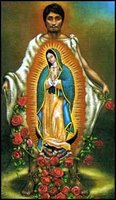 It's time for an Easter Sunday sermon about the worldwide religion that celebrates it.
It's time for an Easter Sunday sermon about the worldwide religion that celebrates it.Some Indigenous American religions have incorporated some Christian beliefs and symbolism into them. A prime example is the U.S.-based, peyote-centered Native American Church. Some of their chants include lyrics about Jesus, whom they regard as a great saint. In a nutshell, the founders of the Native American Church had to flavor mescalito with some Jesus seasoning to legitimize the religion more for legal tolerance of the use of peyote by the anti-halucionogenic plant Demopublican government.
Many Mesoamerican/Latin American indigenous peoples have also incorporated a certain amount of Roman Catholicism into their indigenous religions as a means of avoiding being persecuted as total heritics by the Christocentric mestizo governments and societies they are dominated by. In Mexico, the Virgin de Guadalupe, who was first spotted by the Indian peasant Juan Diego (pictured with her near the end of this post) is revered more than Jesus by Mexican Roman Catholics. Many Mexican Indian traditionalists actually regard la Virgin as the mother Aztec goddess Tonantzín or another tribal equivalent in disguise. Her name was just changed to María and she was dressed in Middle Eastern garb as to avoid being totally forbidden by the Church heirarchy, particularly since she is otherwise portrayed as having a brown indigenous complexion. Ironically, the basilica in Mexico City where the oldest and most famous portrait of la Virgin is on display was built on top of an ancient Aztec temple dedicated to Tonantzín. Somehow the artist was able to paint the reflection of people in the pupils of her eyes, which can only be seen with a strong magnifying glass or microscope.
To this day, even the late Pope John Paul II is revered by many Mexican Roman Catholics more than Jesus, putting el papa in second place in popularity. The poor carpenter from Bethlehem whose character this whole religion was founded upon still places third in overall Mexican Roman Catholic popularity.
Millions of people, indigenous and non-indigenous, get a lot of genuine peace of mind out of the teachings and rituals of the various Christian sects. Others are brainwashed slaves to them out of a superstitious fear that if they don't believe in their church's dogma or at least go through the motions of remaining faithful members of their particular cult, they will subsequently suffer some sort of spiritual rejection in the afterlife. I use the word "cult" is this context because a cult is a religious or spiritual sect that claims to hold a monopoly on spiritual truths and the spiritual portal to a divine afterlife.
The European conquest of the Indigenous American peoples primarily consisted of government soldiers, and also "Christian soldiers" known as missionaries. They worked hand-in-hand in the coercive cultural genocide and assimilationist campaigns towards America's indigenous peoples. Today there are more Christianized Indians than there are indigenous religion traditionalists.
We minority of heathens who choose not to make an ancient Middle Eastern-rooted religion exported to America by Europeans as our spiritual and moral role model, look upon most Christians as not being true Christians, but Biblicans, being that the vast majority of Christian individuals and sects continue to pick and choose ancient customs and moral codes out of the Old and New Testaments to observe and judge others by. They ignore the teaching of Jesus in the New Testament, which says that he came to fulfill the Law of Moses (Old Testament laws) for those who believe in him as the Messiah and do their best to follow his example. He was never quoted as saying that everyone should continue abiding by all rules and traditions in the Torah, nor does it say anywhere in the New Testament that all of the opinions and attitudes expressed by it's authors were that of Jesus. Of course fundamentalist Biblicans believe that everything written in the Bible is the word of the "one and only true god" known by the names of Yaweh and Jehovah, or just plain "God" for short, and that those human mortals who wrote those words down for God were essentially his spiritual dictationists. Indigenous American traditioanlists look upon such religious fundamentalists as being spiritually constipated.
Most Indigenous American traditionalists regard the character of Jesus as nothing more than a Middle Eastern version of a Hindu guru. Guruhood existed in ancient Hindustan (India) long before it came into fashion in the Middle East. Some Indigenous American traditionalists are agnostic towards the existence of Jesus, while others, including some shamans, claim to commune with his spirit along with other great beings. However, they don't necessarily believe that he was the god Yaweh/Jehovah who was conceived by a human female virgin who became impregnated by a divine ghost in order to procreate his human messianic personage known as Yeshua. The belief in avatars (gods who incarnate as humans), immaculate conceptions, and virgin births did not originate with Christianity. Early Middle Eastern and European converts to Christianity incorporated those concepts from their "pagan" beliefs into their practice of Christianity.
"Having faith in Christ for salvatation" was borrowed from ancient yogic Hinduism's, "Taking refuge in the guru for the removal of karmic debt." Indigenous shamans around the world are even known to do this by temporaily taking on the ills of their patients in order to relieve the patient of his or her maladies whether they be physical, mental, or spiritual, and then transferring those maladies into oblivion. An example of unconditional love.
"Christ" from the Greek "kristos" originated with the Hindi/Sanskrit term "krishna," as in the Hindu deity Lord Krishna--the christened or divine anointed one.
The bottom line is, Indigenous American traditionalists reject the Christianist concepts of original sin and divine salvation, and do not believe that any foreign, non-Indigenous American religion is superior to any peaceful, non-sacrificial Indigenous American religion. To believe otherwise is the same as believing that the white race and European cultures are superior to the Indigenous American race and it's cultures. There were ancient times when Indigenous American civilizations flourished while peoples in other parts of the world were still grunting around in caves.
Further examples of how many Christian beliefs and practices were borrowed from other and much older traditions are available via this link:
Further recommended reading:
The core of Taoist religion and philosophy has very much in common with many Indigenous American religions and their philosophies, including my own:





4 comments:
It's true what you say, though I feel you don't really take the huge canal between Chrisitanity and Catholiscism too seriously. Anyway, people are often too much into the Bible than Jesus would have liked. People who obey the book are slaves, and no good to God, who wants love. A free spirit, choosing His love is what pleases Him. Not a blind follower like there are so many.
Also accepting the Truth would be the only way for many CHristians to enter the heavens, which is nonsense of course, heaven would be quite empty then. I believe all good people get their ticket to the spirit world, or dream world as I like to call it. It's really a pity that so many people blindly do what the Bible tells them, read the story of Christ, not the words and letters that are in the book. It's the story of Christ that counts, nothing more.
Though the Bible has some good parts;
"He who shuts his ear to the cry of the poor, will also cry himself but not be heard." Proverbs 21:13
The word "christos" actually comes from Greek, but you're right - it means Anointed One.
A lot of traditional European polytheists hold similar beliefs. Thank you for your input. :)
I have trouble reconciling the views of the indigenous American traditionalists with the views of Hinduism. Hindu scholars seem to view everything in the world as illusion, so much so that having a loving family (wife and children) will bring about karmic debts to be paid off in another lifetime. I agree that there are realer realities than this one, but this idea of karmic debts makes me hopeless since the only way to rid yourself of karmic debts is to completely detach yourself from the world, get rid of all possessions and even your illusory relationships. This seems to nullify the importance of love as well as the beauty of Gaia and the indigenous peoples’ synergy with the earth. Can anyone help guide me to a better, more nuanced version of karma or no karma? I feel I am missing something here.
I agree with what you say. Christianity's concept of "original sin" has its roots in Hinduism's concept of "karmic debt." Both imply that no one who lives up to certain divinely-defined codes of conduct will experience some sort of end to cycles of birth and death, 'nirvana,' or 'eternal salvation' until they do. A "Law of Karma' when not attached to divinity is simply a natural form of affect from certain actions. When the affect seems negative, many human beings perceive it as being a form of metaphysical punishment, whether temporary or permanent.
Post a Comment